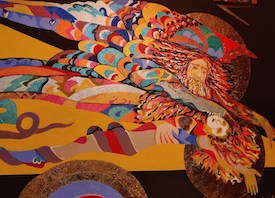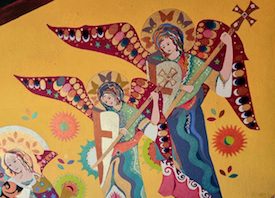Of all the commandments and exhortations of our Lord Jesus Christ in the Gospels, one that at first glance seems utterly impossible for a “mere mortal” is this:
Be ye therefore perfect as your Father in heaven is perfect.
Matt. 5.24
Not only is this seemingly impossible, living in a body subject to corruption and illness, both physical and mental; but we are being asked, indeed commanded, to be as perfect as God Himself is, eternal in His Heaven, in a state of unchanging incorruptibility. How can this be possible?
Loving your neighbour as yourself, doing good, caring for the sick and poor and fatherless – all of these are easily within the bounds of conceivability, and without too much effort can be achieved; indeed one could say that in a civilized society these should be normal. But being perfect? That is something else altogether, something on a completely different scale of reckoning.
If we examine for a moment our concept of perfection, we might ask from where do we even get the notion of it in a finite world subject to entropy, and where suffering and death are never far away? And do we not, deep down, yearn for the perfection which is eternal, which will never disappear, a bit like a never-ending beautiful sunset; or, to make it personal, a perfect marriage or love affair where one remains forever blissfully in love, never losing “that loving feeling”? The answer can only be that we get our notion of perfection, as well as all other divine attributes, from the God who created us, who is Himself perfect in every conceivable respect.
One of the greatest thinkers among the early Church Fathers, Origen of Alexandria, asserted that our souls were created by Almighty God before our physical birth.1 God is perfect, and, as we are created in His image,2 it follows that we must have been born with the potential or idea of perfection in us. Concerning this, another of the Church Fathers, Gregory of Nyssa, wrote: “To allow participation in God there must be something in the nature of the participant which is akin to that in which it participates. This is why Scripture says that man was born in the image of God”.3
In another work, he argues that ‘the divine image in humanity means they contain in themselves all the divine perfections’; but whereas these are found in God essentially in His nature, in us they are present as a gift by participation.4
The Church Fathers, notably those of Alexandria and the Byzantine era, together with the Cappadocians of the 4th C, led the way in seeking the path to perfection. Taking their guidance from Scripture (see Biblical References to Theosis), they proclaimed that our salvation is in fact our deification (theosis in the Greek) – that is, becoming gods in Christ. In fulfilling the destiny which God intends for us, by accepting His invitation to become His gods, we are thereby fulfilling His command, “Be ye perfect…” What is impossible for us is possible for God.
The path of life for the Orthodox Christian traditionally follows three stages: Purification, Illumination and Deification; the third stage is sometimes named perfection,5 so clearly there is an assumption that deification equals our spiritual perfection and vice versa. There follows a selection of quotations from the Church Fathers concerning perfection and theosis; one Father, Diadochus of Photice, actually wrote a work entitled “One Hundred Chapters on Perfection”.
[NB – direct quotations from the Bible and Fathers are shown thus “…” while paraphrases from later commentators have ‘…’]
Irenaeus (2nd C) ‘Now what is the deification of created beings, if not their perfect participation in the divine life?’6
Clement of Alexandria (2nd C) “[The] perfecting of man as man is consummated by acquaintance with divine things … It [knowledge] leads us to the endless and perfect end, teaching us beforehand the future life we shall lead, according to God, and with (the) gods… After which redemption the rewards and the honours are assigned to those who have become perfect… and they are called by the appellation of gods, being destined to sit on thrones with the other gods that have been first put in their places by the Saviour.”7
Origen (2nd/3rd C) ‘Perfection consists in being assimilated to God… The image appears to us now; the likeness is a possibility of perfection…’ Origen defines this ultimate state of perfection: “God will be all in all.”8
Gregory of Nyssa (4th C) ‘Another of Gregory of Nyssa’s quiet… corrections of Origenian ideas is his replacement of the latter’s concept of perfection as a conditional stasis with his own dynamic notion of perfection as an endless progress (prokope) into the divine life… The key notion here is the… replacement of the Platonic term of “assimilation” by Gregory’s Christianized keyword “participation” (metousia theou).’9
Note the replacement of a passive term by an active term – the word “perfection” can be taken in a final, static sense or as an ongoing process.
Diadochus of Photice (5th C) “The inner sense reveals indeed that we are in the course of being formed in His likeness, but the perfection of this likeness we shall know only by illumination.”10
Maximus the Confessor (7th C) “The one who achieves perfection attainable to men here below bears as fruit for God love, joy, peace, endurance for the future, incorruption and eternity, and things similar to these. And perhaps the first things belong to the one who is perfect in the active life while the second belong to the one who through genuine knowledge [experience] has gone beyond created things.”11 [Presumably the “first things” are love, joy, peace and endurance, while the second things, fruits of the contemplative life, are incorruption, eternity, etc.]
And, perhaps a little melodramatically, St Isaac the Syrian (7th C) writes: “The sign of those who have reached perfection is that even if they were to throw themselves into the fire ten times a day for the sake of humanity, they would not be satisfied.”12
To sum up, clarify and elucidate the above here are a few concise references to perfection in The Autobiography of God Almighty, in the “note to Suze”, by Jim Overbeck (p.32 – 36):
- Man is imperfect. Hence man is incomplete.
- A person is a perfect man.
- A perfect man is what God became minimally.
- A perfect God is what man becomes maximally.
- One is perfect in God, not in not-God.
- Worldly – earthly – knowledge is incomplete. The world needs perfection to complete its knowledge. God is perfect.
In Overbeck’s view, true being is divine being – anything less lacks true being; and the fallen gods, who deny their true being, collude in staying that way; thus he equates atheism with psychosis, i.e. in denying (the essential) part of one’s being/identity.
- Imperfection exists only for those that lack being. Imperfection lacks being… Imperfection is the contrived consciousness of the imperfect. God does not create imperfect being….
- Imperfection is a defence mechanism of the [fallen] gods.
- The imperfect are in rebellion against perfection.
- Imperfect man participates in God minimally. Perfect man participates in God maximally. Man is a movement between perfection and imperfection…
Here Overbeck refers to man’s creation in the image and likeness of God: (cf Genesis 1.26)
- Man is made in the image and likeness of God. Man is the perfect image of God, not the imperfect image…. The image is God.
- A man who dwells in the world is imperfect. A man who dwells out of the world is no longer a man. A man who becomes perfect is not only a man. Such a man assimilates – “assumes” – imperfection and transforms it.
- A man is an imperfect god.
- A god is a complete man.
- It is only possible for a man to become a god in God. God is minimally god. A god is maximally God. A god is minimally perfect. God is maximally perfect and above perfection.
References:
- For example, in First Principles, Bk II, Ch 6 Origen writes, “The only-begotten Son of God… through Whom… ‘all things visible and invisible were made’… both made all things and loves what He made… He granted invisibly to all rational creatures.. a participation in Himself, in such a way that each obtained a degree of participation proportionate to the loving affection with which he had clung to Him. But… by reason of the faculty of free will, variety and diversity had taken hold of individual souls, so that one was attached to its Author with a warmer and another with a weaker love…” [It has been suggested that the Greek word for soul, ‘psyche’, was derived from the word ‘psychos’, meaning cold, since as souls fell away from God they ‘cooled down’]
- See Genesis 1.26
- Discourse on Children in Gregorii Nysseni Opera, ed. E. Muhlenberg 3.2:79
- De Opificio Hominis 4, quoted in Partakers of the Divine Nature ed. Christensen and Wittung, p 107.
- Eg, in Ch 5 of The Ecclesiastical Hierarchy, Dionysius the Areopagite describes the triad of Catechumen, confirmed Christian and Hierarch in these terms, ie those being purified, illumined and perfected.
- Paraphrase from Against Heresies by V. Lossky in The Vision of God, p 42.
- Miscellanies (Stromata) Bk VII, Ch 10.
- Paraphrase from First Principles, Bk III, Ch 6 by V. Lossky, op. cit. pp 56-7. The phrase “…God will be all in all” is taken from 1 Corinthians, 15.28
- The Strategic Adaptation of Theosis by J. A. McGuckin in Partakers of the Divine Nature ed. Christensen and Wittung, p 106.
- One Hundred Chapters on Perfection, Ch 89.
- Two Hundred Chapters on Knowledge, 2nd Century, 6. (Cf St Pauls’ in Galatians 5.22 and Romans 2.7)
- From the Philokalia, compiled 18th C.




